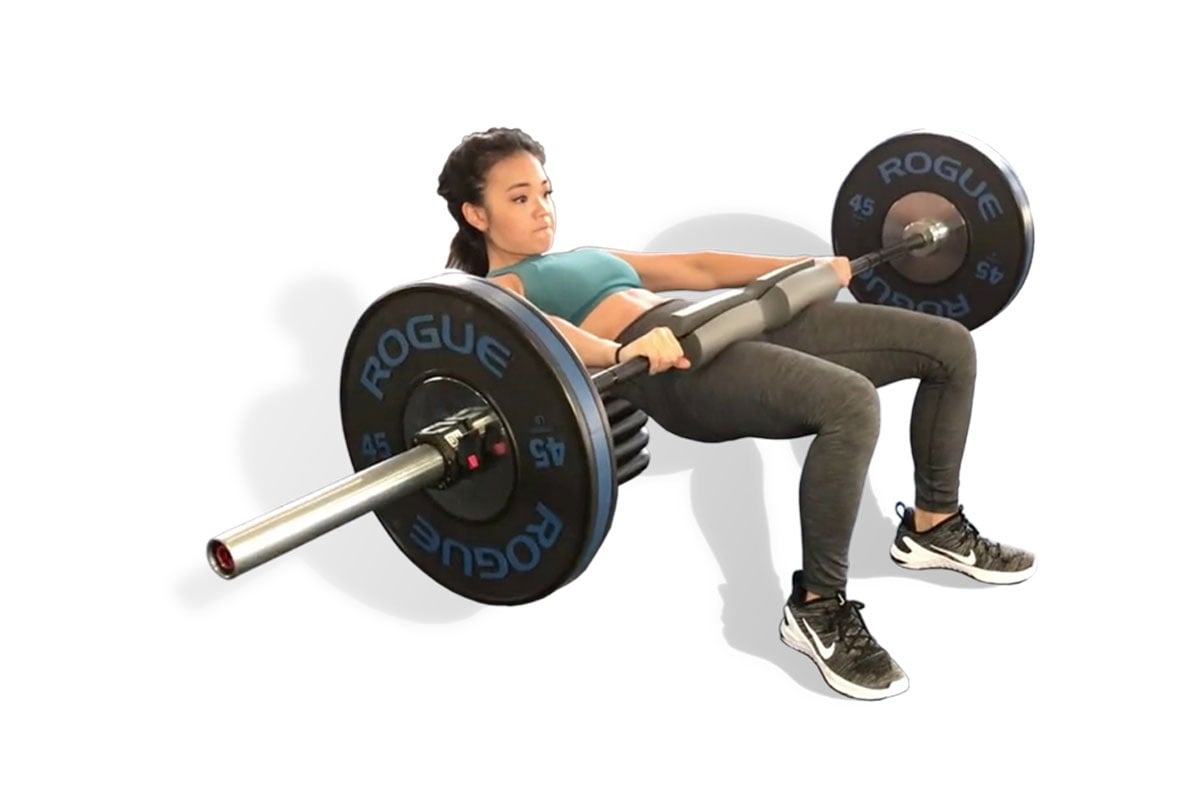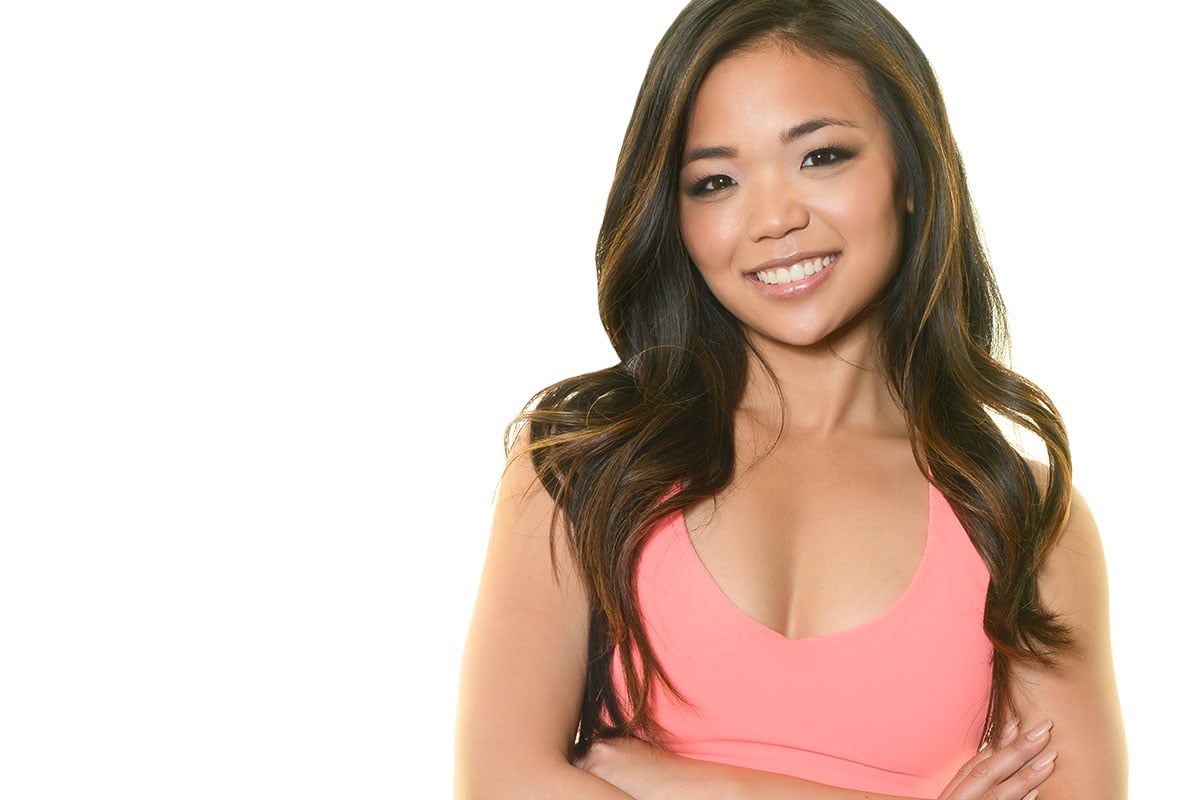%20(1).jpg?width=300&name=afm_spring_2019_final_sm-(1)%20(1).jpg) Originally appeared in the spring 2019 issue of American Fitness Magazine.
Originally appeared in the spring 2019 issue of American Fitness Magazine.
The SoheeFit studio in San Diego is a gleaming, modern and welcoming fitness center with upbeat music. One thing is noticeably missing, though. There is no cardio equipment. That’s because owner Sohee Lee, MS, typically ends up prying her driven, exhausted clients off their cardio-driven devices in favor of free weights and a balanced diet.
“I love helping women fall in love with weightlifting,” she says, “and thrive the hell out of life.”
Lee is the founder of the “Eat. Lift. Thrive.” movement. She is also the author of a book by that name, as well as the e-books The Beginner’s Guide to Macros and The Beginner’s Guide to Bikini Competitions.
Both a fitness coach and a sports nutritionist, she has developed an evidence-based program that emphasizes highly subjective, customized strength training combined with salutary calorie counting. Sustainability is the goal, along with good health.
If clients are looking for a crash diet and fast results—or a grueling workout that slacks off when they’re bored, tired or busy—they are probably in the wrong place. After years of research and personal experimentation, Lee always factors in the fallibility of human nature and the age-old pleasure principle.
“If you don’t enjoy what you’re doing,” she says, “you probably aren’t going to keep it up. People tend to think that suffering will yield the best results. It doesn’t.”
Lee does not focus on or obsess about measurements, even while she is helping people whittle them down to reach a goal. “I’m much more concerned with feeling good than looking good,” she says. “I’m interested in psychology and behavior, in developing good habits that last.”

Interventions That Work
Other personal trainers can relate to this scenario: re-educating a client who has been misled one way or another. Most of Lee’s clients come to her a little worse for wear, after getting bad advice and poor results from sweating for hours on a track or an elliptical machine.
“They’re overeager to change their lives,” she says. “They set goals that are too lofty and too drastic without outlining how to get there. So they commonly burn out and quit. Or they regress and get into worse shape than they were originally.”
Lee functions as her own billboard. A 5-foot-2-inch dynamo of sleek sinew, she’s a winner of the OCB Yorton Cup natural bikini competition. She looks as if she works out several hours each day, but really, it’s only three or four times a week, often to a soundtrack of ’70s music. And she enjoys French fries and ramen. “I’m all about busting the fat-loss myths,” she says.
Once, while preparing for another bikini competition, she ate a Snickers bar every day to prove that you can consume anything and maintain your results—if you are eating correctly overall. Her secret? “Mastering the fundamentals of nutrition.”
Some little tricks can help. “I like to talk about what I call ‘bite-sized behavior goals,’” she says. “Just leaving off the half-and-half in your latte makes a difference, as does replacing one starch in a meal with one vegetable. Those changes are manageable and provide your micronutrients.”
Trigger foods can be a stumbling block for clients, but they can be conquered. Lee approaches this by reminding clients they are in control. “Break the cycle—get it out of your kitchen,” she tells them.
“Think about the negative experiences you had with that specific food in the past. What was going on? Where were you? What were you feeling? These factors all contribute to the ease or difficulty of eating in line with our values. When you’d like to have the food again, have it under your terms. Keep the supports in place to rack up many experiences where you eat that food in a way you are happy with. Gradually ease up on these parameters until you are confident enough to reintroduce the food.”
And when a client succeeds? “Celebrate!”

Shifting Meal Mindsets
The unspoken hero of many personal training interventions is behavior change. Helping clients get on board with a new way of thinking about and approaching exercise and nutrition makes up a hefty piece of the success pie. Many of Lee’s clients have slashed their caloric intake too low, and Lee urges them to raise it to something like 2,100 per day, depending on their regimen.
“I was running 12 miles on 1,000 calories a day before I got together with Sohee,” says Tran Tu, who lives in Houston. “I was doing excessive cardio, and she advised me to cut it out.” Over 9 months, Tu says she expanded her intake to about 2,100 calories a day.
“I was very hesitant about adding more calories, but eventually I learned to trust the process. I gained a few pounds, but my clothes fit me better. The composition of my body changed.”
Lee’s other clients share similar stories about their initial reluctance to follow her guidelines. Her advice about eating more and doing less cardio seems very counterintuitive to the conventional wisdom of American dieting.
“It took me a while to trust her,” says Alida Lippa, a retiree in Laguna Niguel, California. “I was doing fad diets and lots of cardio. I had really wrecked my metabolism. Now I lift weights 4 days a week for about 45 minutes, and I’m eating in a way that doesn’t leave me feeling hungry.
My only cardio is a leisurely walk. I’m in better shape now than I was 10 years ago. She totally changed my perspective and helped me find balance in all areas of my life.”

Compassion Comes From Experience
Lee understands firsthand the striving, obsessive mindset of her clients. She was born in Seoul, South Korea, famous for its rigid, high-pressure beauty ideals (many people consider it the world’s plastic-surgery capital). She first moved to the U.S. in 1992 but lived all around the world growing up, finally moving here permanently when she began attending boarding school in 2005.
As a teenager, she struggled with bulimia for 8 years. “I was a fanatic,” she says. “I lacked awareness and education. The message all around me was that you had to be skinny to be pretty. I thought I’d be prettier and happier if I were skinnier.”
On her website (soheefit.com), she posts a haunting photo of herself from that time in her life. Over the course of 3 months, she dropped down to 80 pounds. “I hate to see other women—and children—getting sucked into that way of thinking. Now I know that your quality of life is more important than getting skinny.”
Lee says she “stumbled into fitness” after an aha! moment when she saw the cover of a health magazine. “It was a fitness model—I don’t remember who—and, while my thought process was not ‘This will help me overcome my eating disorder,’ it was . . . the impetus that got me moving in the right direction.”
In college, Lee pondered ways to translate her newfound interest into a career path. She had a flair for writing, so she tried journalism and marketing. It occurred to her that she did not see many women’s bylines on the fitness blogs she was reading, so she started her own—and quickly found a receptive audience.
“I was, and am, very interested in the psychology and behavioral aspects of fitness,” she says.
She has racked up the credentials to prove it. Lee has a bachelor’s degree in human biology with a concentration in psychosocial and biological determinants of health from Stanford and a master’s degree in psychology from Arizona State. She did her graduate thesis on the psychology of eating behavior.
She is also a certified sports nutritionist, through the International Society of Sports Nutrition, and a certified strength and conditioning specialist. Moreover, she is about to embark on a PhD program in strength and conditioning.
“Sohee is always learning, which is important for me as a client,” says Nikki Botts, from San Diego. “I want to know that my coach is constantly trying to improve herself, just like me. It also gives her a larger database of exercises to pull from and a better understanding of how she can make alterations for programs.”

Sticking to Science
Currently, Lee coaches dozens of clients—online and in person, scattered across the country—and writes prolifically for her blog and podcasts as well as other educational platforms. She is dedicated to providing the most up-to-date information available and strives to help her clients connect the dots without shame. In addition to being held in high regard by her clients, Lee gets rave reviews from her peers.
“Sohee understands physiology and how the body responds to food,” says James Krieger, CEO of Weightology. He has collaborated with Lee in her research. “She’s very honest and doesn’t give out information that is incorrect.
Her program also incorporates a lot of flexibility. There is no one right way to do something, no magical formula. Adherence is what’s important. Also, with Sohee, there are no good or bad foods. It comes down to the amount you eat.”
Her clients love the results and feel confident that they’re sustainable because of Lee’s commitment to doing it right. “Sohee is different from other coaches because she is science-oriented, [stays] on the cutting edge of industry research, and really thinks outside of the box when programming,” says Botts, who came to Lee’s studio with some injuries. “Sohee was able to adapt exercises so that I was still able to make progress toward my goals. I was so impressed with how she adapted exercises and was willing to meet with me to find the right lifts that didn’t cause pain.
Sohee is extremely responsive to her clients’ needs, encouraging and adaptive. I can tell she really cares about what is best for her clients, even if it is taking a break from dieting for a bit, which scares many women.”
Other clients also cite her personal warmth as a confidante. “I give tough love,” Lee says, “but I’m not a jerk. I’m not a cheerleader either. I try to be a compassionate coach, gently nudging. If a coach is mean, the client doesn’t feel comfortable opening up. I want my clients to feel comfortable being perfectly honest with me.”
Lippa says, “Sohee doesn’t scold you or [program] more cardio. You can tell her you messed up, that you’ve overeaten, and she will just ask you, ‘What happened?’ She gets to the root of it, whether it was emotional eating or some other cause, and you can be mindful for the next time you’re tempted.”
Marie S., in Los Angeles, was barely eating while doing 2 hours of cardio a day—without losing weight. “It is through her coaching that I went from eating 75 grams of carbs a day to about 330 g of carbs with a fraction of the exercise,” she says. “I now lift three to four times a week and do 20 minutes of cardio twice a week. She taught me to let go of my fear of food and embrace strength training.”
Tu says she was drawn to Lee because of her personal experience with eating disorders. “I was going through a dark time in my life for 2 years with disordered eating and body dysmorphia,” she says. “It was affecting my relationships; I was pushing people away. It was nerve-wracking to send Sohee my measurements and my progress photos because I had such a bad relationship with my body. But she changed all of that. I wish I had met her sooner. My advice to other women who are in a similar situation is to reach out and get help.”
Another client who has overcome bulimia with Sohee’s help is Andrea Szocs, who lives in Norway. Szocs says that sometimes she feels as if Lee knows her body better than she does. “She is my coach, but she is also like a friend to me,” says Szocs. “I trust her, and that is why our partnership is working so well. I think trust is fundamental in a relationship like this. I have never questioned [her programming], and [I’ve] made amazing progress while working with her. I have shed almost 10 kilograms of body fat, and I have become stronger and leaner.”
Szocs adds that Lee also helped her shift her mindset. “It’s important to me to do this right, to not get messed up mentally again when starting to register my calories,” she says. “Sohee supported me all the way using her knowledge and experience. The fact that she has listened to me and paid attention to my needs and wishes makes me sometimes think of her as my fairy godmother.”
Lee cherishes these testimonials.
“When it comes down to it, fitness in and of itself is not what I’m passionate about,” she says. “It’s you and what’s inside that noggin of yours. It’s what exists between me and you—this thing called a connection. A bond. I get such a high off nurturing something so intangible and watching as we help each other in some way. There’s no one-size-fits-all strategy. I want to make fitness work for you, not the other way around.”
NASM NUTRITION CERTIFICATION
The new NASM Nutrition Certification offering combines the most current nutrition information with behavior change and coaching strategies to amplify your clients’ success. You’ll grow your ability to navigate through nutrition headlines and use evidence-based nutrition science to put credible theory into practice.
Keeping the success of fitness professionals and their clients as the center of attention, NASM worked with a team of industry-recognized nutrition and coaching subject matter experts, including Sohee Lee, to create this comprehensive certification.
Whether working with clients face-to-face or online, you’ll learn to develop customized nutrition programs and guide clients to make food choices to meet their goals, while staying within your scope of practice.
Visit NASM.org to learn more on how you can leverage this certification to help your clients successfully attain their goals and how you can maximize adherence, reduce turnover, increase your service offerings and boost everyone’s bottom line.
SOHEE’S TIPS FOR CLIENTS
Here are some healthy sound bites Sohee shares with her clients:
Start first with calories and macronutrients: “Remember that 1 g protein = 4 calories, 1 g carbohydrate = 4 calories, and 1 g fat = 9 calories,” she says.The most important macro is protein, according to Lee. “Ideally, consume some protein with every meal. As for the others, ratios differ. Go with lower carbs if you prefer higher fats and vice versa as long as you track your calories.
That way it is flexible and not overwhelming.``''You can change your body composition by managing your calories. It’s not glamorous. It’s not fancy. But it works. A scale helps with precision.``''Be brutally honest and include all of your snacks. However, minimize the deprivation. If it feels easy, you’re more likely to stick with it. Don’t be a martyr.”If you are dining out or traveling, “portion control is your friend.”
Note: When talking with clients about nutrition, it’s important to stay within your scope of practice as a fitness professional. For example, offering services such as nutritional therapy to treat chronic disease or providing nutritional counseling for eating disorders falls within the area of authority of a registered dietitian or qualified medical professional.
















